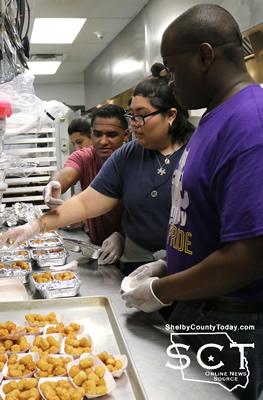
October 18, 2017 - Alease Copelin, a counselor at Center ISD, spoke recently to the Rotary Club of Center about a new program the school has initiated, Food Recovery, and about two additional programs.
Raeford Copelin introduced Alease speaking about her efforts to fight hunger locally, "Hunger across the United States and even locally is a chronic thing. It is ongoing in that I think it would surprise you to know how many elderly and how many young suffer with hunger even within our own town. Alease saw that need."
She spoke about three programs: the Backpack Program, In-House Food Pantry, and the newest Food Recovery Program.
The Backpack Program is a child hunger program through the East Texas Food Bank. The program helps to provide food to children who are identified to be food insecure which means their primary source of food comes from school. During the week the children eat breakfast and lunch at the school, however, the weekends are what the Backpack Program is focused on. It provides food which is easily prepared by a child for them to eat.
When asked how the Backpack Program was funded, Alease said, "Our primary form of support for the Backpack Program now is our Flags to Fight Hunger Program. You see on our holidays the flags that go up around town, all the funds, 100% of the funds generated from that program help fund the Backpack Program."
"Another program which was started last year and I'm really proud to say that in East Texas, in the East Texas Region for the East Texas Food Bank, we were the first public school to pilot a food pantry within a public school. They are being tried across the country. They are more common in larger cities but not in the rural area. And so I had visited with the contact at the food bank and he's talked about it and I said, 'We'll do it. We will be a pilot program.'"
Alease explained last year the school piloted an in-house pantry at the F.L. Moffett campus and it went very well. The program is designed to be an emergency pantry if a family suffered a job loss or maybe an illness and income levels changed for a short time. Most of the families which have utilized the program averaged about three months before coming off the program. It is a short term program.
 With excitement she continued, "The third program that I want to tell you about that I'm most excited about and that is our Food Recovery Program."
With excitement she continued, "The third program that I want to tell you about that I'm most excited about and that is our Food Recovery Program."
She recalled noticing a snippet come across her Facebook feed about a year ago about Baylor University receiving an award for community service which drew her attention. Reading the article made her want to learn more so she called Baylor University and she found out about several programs but the one which caught her attention most was the Food Recovery Program. The Food Recovery Program involved college students collecting food from campus cafeterias at the end of each day which is not eaten and then taking it to the Salvation Army to be served the next day. Alease said, "When he said that I thought Center ISD has four cafeterias that serve food everyday and throw away food everyday."
Alease said, "We can't do [everything] Baylor's doing but I think we might can do something and so I went and visited with Doctor Hockenberry and said you know what I think we can do this."
Alease went into the procedures cafeterias must follow including the fact that they can't reserve the leftover food. At the end of lunch if half a tray of food doesn't get eaten, it goes in the trash, because they are not allowed to serve it the next day. With Hockenberry's blessing, Alease said she went to visit with Sherry Harding the Director of Shelby County Outreach Ministries about the meals on wheels program.
The Meals on Wheels Program provides meals during the week for elderly and shut-ins but what about the weekend? This reminded Alease of the Backpack Program and how it helps with weekend meals.
Now Center ISD high school students go to the cafeteria at the end of lunch time and cafeteria staff members then give the students the food which they pack into to-go containers. The containers are frozen during the week until Alease and her husband Raeford collect the frozen meals on Thursday so that they can be delivered on Friday with the meals on wheels deliveries. The extra meals provide food for the weekend for program participants. All food collected is recovered food which would have been normally thrown away. The school isn't making more food; however, what is left over is passed along to feed those in need.
The students of Jennifer Fausett, the Culinary Department instructor, who are participating in the program all have food handlers certification and have found it inspiring. Each time three to four students take turns packing the meals. It varies how many meals are packed each day. The students remembered packing 24 meals recently but have packed up to 88 meals.
When asked what the students thought about the food recovery program, they responded, "I think it's really, really nice," and "I think its a positive thing too to help those who can't get out for their health."









